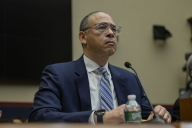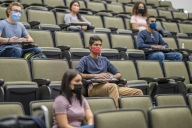You have /5 articles left.
Sign up for a free account or log in.

Bates College
Photo by Phyllis Graber Jensen, Bates College
Rising COVID-19 infection and death rates are prompting colleges and universities that are hoping for in-person instruction in 2021 to again shift their calendars and push back the start of the spring semester.
After adjusting their calendars last year -- including eliminating spring and fall breaks to reduce student travel and spread of the coronavirus, and delaying the start of the spring semester to make it safer to have in-person instruction -- many institutions are now scrambling again to respond to the changing picture on the ground.
Some colleges are having the first month of instruction online and will then switch to in-person instruction. Other colleges are moving back the start of the spring semester. Many institutions have not changed their plans for the spring but have said they are watching the situation. And colleges that plan mostly online semesters aren't worried.
Pennsylvania colleges have been particularly active. In late December, the acting state secretary of education, Noe Ortega, urged colleges to delay the start of their spring semesters to February.
“We are seeing an alarming increase in COVID-19 cases and hospitalizations, and these trends are expected to worsen in January at the time when students normally return to campus,” he said in a statement. “Colleges and universities play a critical role in mitigating the spread of COVID-19 and creating safe learning environments for students. By delaying students' return to campus, our institutions of higher learning can help slow the spread of the virus, help businesses to remain open, and protect regional health care systems.”
In response, Pennsylvania State University will start the spring semester online because of "extensive analysis and scenario planning given worsening virus conditions nationally and across the state indicating predictions of rising hospitalization rates in the coming weeks," the university announced.
The university will start classes online on Jan. 19, the original planned date, and will continue that way until Feb. 12. On Feb. 15, classes will transition to in person.
“While we know this creates a number of challenges for our community, we are very concerned with the current outlook across the country and the commonwealth and believe this is the most responsible way to begin our semester. Shifting to a remote start has been a scenario we have been preparing for by building flexibility into every level of our operations in order to prioritize our students’ academic achievement,” said President Eric J. Barron.
While the dates vary, numerous colleges in Pennsylvania have announced plans to move back the start of the spring semester.
The York Daily Record reported that the institutions include Bryn Mawr College, Duquesne University, Saint Vincent College and Seton Hill University.
College officials said that even if they could protect students on their campuses, asking students to travel long distances right now is problematic.
The changes are not unique to Pennsylvania. The State University of New York announced in November that it would move the start of the spring semester to Feb. 1.
Private colleges are also adjusting their schedules. Cazenovia College, near Syracuse, N.Y., announced that it would begin classes on Feb. 1, two weeks later than planned. President Ron Chesbrough said of the decision, "We want to provide students, faculty, staff and the college community with the safest conditions nationally and avoid a possible surge after holiday gatherings." Daemen College, near Buffalo, is delaying the start of the spring semester by three weeks, to Feb. 15.
In Maine, Bates College is extending winter break by one month. Students will be invited back to campus Feb. 12 to complete two COVID-19 tests and receive results before the beginning of classes on Feb. 17.
Clayton Spencer, the president, wrote to students to explain the changes last month. "Trends in infection rates, hospitalizations, and deaths have worsened steadily over the past six weeks, nationally and in Maine, and they are likely to intensify over the holiday season as people travel and families gather indoors," she said.
"Based on the course of the pandemic nationally and in Maine, and consultation with experts, we have concluded that it is not prudent to bring students back to campus, as planned, in early January. Our students would be traveling at or near the height of the current surge in cases, potentially creating health risks for these students and significant challenges for the college and student well-being once they arrive on campus."
At Bowdoin College, the spring semester will begin Feb. 8 -- two weeks later than normal.
In Ohio, Oberlin College decided last month to start the spring semester on Feb. 1 instead of Jan. 7. The college said in a statement that it considered an online January, but "ultimately, we opted for a delayed start so that we can preserve the on-campus experience to the greatest extent possible."
In Minnesota, Carleton College will begin the spring semester as scheduled -- today. But the first two weeks of classes will be online and students are being asked to return to campus after the first of those weeks.
The trend extends to Southern states. In Florida, where faculty have been critical of public university plans to resume full course schedules in the spring, Bethune-Cookman University, a historically Black college, plans to have the first month of classes online. Classes will start Jan. 11, but in-person instruction will resume Feb. 15. And students can return to campus from Feb. 11 to 13. The plans were released on New Year's Day.
Mississippi State University has delayed the start of classes only five days -- from Jan. 6 to Jan. 11.
"At this juncture, as COVID-19 is now a growing threat in Mississippi, this course of action is prudent and provides us the best opportunity to make the transitions necessary to most effectively balance our educational responsibilities as well," Provost David R. Shaw said in a statement. "We know that with New Year’s Eve celebrations there is the possibility of additional exposures and infections; this delay will allow time for infections to run their course prior to students’ return to campus."
At Auburn University, the institution is planning to stick with its original plan to begin the spring semester Jan. 11. But "in an effort to gradually increase campus density, faculty offering face-to-face classes may choose to begin the semester remotely for up to two weeks," said a university statement.








